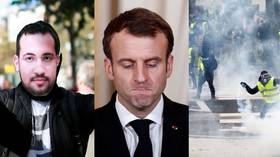'Nostradamus' Macron mercilessly mocked on Twitter for last year's New Year 'cohesion' vows

Looking back at 2018 and the French president's vows to unite the nation, disappointed twitteratti noted the situation in the country, divided by the Benalla affair and the Yellow Vests riots, is not so rainbow-bright after all.
"In my view, 2018 will be the year of national cohesion," the centrist Macron ambitiously wrote in his New Year's Eve message a year ago. That prediction hasn't aged well, and Twitter noticed.
— Samy Oulmane (@oulmanesamy) December 24, 2018
"We saw that [cohesion] with the Benalla affair and Yellow Vests," one user noted, adding that "words are no longer enough to conceal poor management of the country and decisions that go against the interests of [French] people."
"What clairvoyance","#nostradamus", the sarcastic comments went on.
And, if 2018 was thought to be the year of unity, many people got worried about imminent 2019. "And after the cohesion of the nation, what would you call Year 2019?"
Others said that Macron was right, and there was "cohesion" in the country – against his government, that is.
France has never been as fractured as it was in 2018, one more person noted, adding that the president probably divided the nation "to better reign" over it.
Faced with record-low ratings, Macron was criticized for handling the case of his [now former] bodyguard Alexandre Benalla. The scandal, probably the biggest in Macron's presidency, kicked off in summer 2018 when a video emerged showing the 27-year-old Benalla dressed as a police officer and beating two protesters during a May Day rally in Paris. The 'affair' exploded after it was revealed that the Elysee Palace had been informed of Benalla's misconduct but failed to report him to police.
Soon after that matter cooled down a little in the media, another major event hit the headlines: The Yellow Vests movement. Started initially as a rally against fuel price hikes, the protest then swept the whole country, with demonstrators demanding lower taxes and even the resignation of the president himself. Though the government swiftly suspended the tax rise and even increased minimum wages, that wasn't enough to immediately end the protests.
Apart from these major events, Macron was occasionally caught making outlandish public statements. He was criticized for telling retirees to stop moaning about pension cuts, and for claiming that educated women won't choose to have a large family.
"King for the Rich," "King of bling-bling", "President of the Wealthy", "Jupiter" – these are a few nicknames given to Macron both by fellow politicians and by ordinary folk online. Even his New Year's trip to the posh resort of Saint-Tropez on the eve of planned Yellow Vests rallies came in for harsh criticism. "Saint-Tropez is the bling-bling symbol of France, it [embodies] success, the absence of problems," Benjamin Cauchy, one of the Yellow Vests' leaders, said, pointing out that it's not as sunny in the rest of the protest-plagued country as in the French Riviera.
Think your friends would be interested? Share this story!












